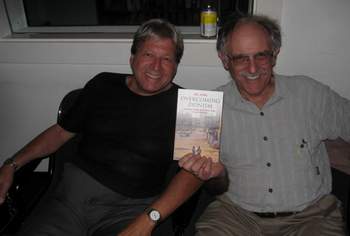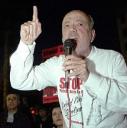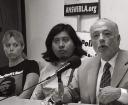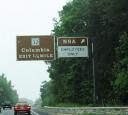Censorship, Targeting Muslims, Truth to Power
Podcast: Play in new window | Download


Lawyer’s Committee on Nuclear Policy
After the 2001 attacks on the United States, attention has been drawn to marginalize nuclear weapons and increase global cooperation on the control and non-proliferation of nuclear weapons and nuclear material. As of 2006, there are estimated to be at least 25,000 nuclear weapons held by at least eight countries, 96 percent of them in the possession of the United States and Russia
Rather than intensifying such efforts, the U.S. has adopted a policy of elevating the role of nuclear weapons in its overall military strategy. John Burroughs, Executive Director of the Lawyers’ Committee on Nuclear Policy, claims that this will reduce U.S. and global security, not increase it.

Guest – Dr. John Burroughs, adjunct professor of law at Rutgers Law School and serves as Executive Director for the Lawyer’s Committee on Nuclear Policy. The LCNP was instrumental in bringing the landmark case before the International Court of Justice in 1995 that resulted in the advisory opinion of 1996, which stated that the threat or use of nuclear weapons is illegal.

He is co-editor of Rule of Power or Rule of Law? An Assessment of U.S. Policies and Actions Regarding Security-Related Treaties, Apex Press, 2003. He has published articles in the Bulletin of the Atomic Scientists and the World Policy Journal, most recently co-authoring “Arms Control Abandoned: The Case of Biological Weapons.”
—

University of Michigan Press Halts Distribution of Joel Kovel’s book: Overcoming Zionism, Then Later Resumes Distribution.
Co-hosts Michael Smith and Michael Ratner talk with Joel Kovel about the efforts of the University of Michigan Press to halt and then resume distribution of his book. Read article here: Michigan Resumes Distribution of Anti-Israel Book.
Excerpt from: A Book On Hold
Late last month, the blog, Dissident Veteran for Peace — printed what it says is an e-mail from Pochoda, the press director, to Kovel, explaining why distribution was halted. Pochoda declined to comment on the e-mail, but Kovel said it was accurate. The e-mail reads: “Because it is a distributed title for Pluto Press, no one at UMP had read Overcoming Zionism prior to the Stand/With/Us diatribe. I and others read it after that assault, and had fully expected to gear up for, at least, a free speech defense. Though I had no trouble with the one-state solution your book proposes nor with a Zionist critique, per se … I (and faculty members I asked to read the book, as well) were apalled [sic] by your reckless, viscious [sic], and unmodulated attack on Zionism and all Zionists.”
Related reading – Campus Watch

Excerpt from Michael Smith’s review of Overcoming Zionism.
How did Kovel, a Jew from Brooklyn, the oldest son of Ukrainian immigrants who did well – moving with Joel to “the purgatory of Baldwin, Long Island†– come to this radical critique and equally radical solution? Joel graduated from Yale and became a successful psychiatrist. He taught at medical school before switching careers and taking a social science professorship at Bard, where for a time he held the Alger Hiss chair. He is still there, the only Marxist on the faculty. This book is not going to further his career.
“What kind of Jew am I?†he asks, and answers “a very bad one.†More accurately, he defines himself as what Isaac Deutscher called “a non-Jewish Jew.†Not that he is not spiritual; he writes of reaching for the infinite. But he is not religious. Being part of a sect is too narrowing and confining. He identifies with the Jewish heretics who transcended Jewry, but who are nonetheless part of the Jewish tradition – he lists Spinoza, Marx, Freud, Proust, Einstein, Kafka, Wittgenstein, and Luxemburg – and for whom “the true glory†of being Jewish is to live “on the margin and across boundaries.â€
Uncategorized
Joel Kovel, Overcoming Zionism: Creating a Single Democratic State in Israel/Palestine (London and Ann Arbor Pluto Press, 2007).
Joel Kovel has given us an impressive and important book. Its first printing sold out without a single review, major or otherwise. Nevertheless word of this extraordinary work is spreading. The taboo in the United States (not Israel) against seriously discussing and criticizing Zionist Israel has been broken with the publication of Jimmy Carter’s bold book labeling the situation in the Occupied Territories “apartheid†and with the exposure by prestigious professors Mearsheimer and Walt – in the London Review of Books after rejection by the Atlantic Monthly – of the power of the Israeli lobby. Kovel, by focusing squarely on how to “overcome†Zionism, takes the discussion exactly where it needs to go from there. He writes beautifully, even poetically, not just on Zionism’s sordid history, but on its ideology, its ethics, and even on the terrible ecological devastation in Israel itself, where every river is polluted, some to lethal levels. And he writes with courage and hope.
Kovel believes that the creation of Israel in l948, as a colony of settlers who established an exclusively Jewish and discriminatory state, has created a multi-faceted disaster – “a dreadful mistake†– that should be undone, with Israel de-Zionized and integrated into the Middle East. His solution is stated in the book’s subtitle and restated in the title of the last chapter: “Palesrael: A Secular and Universal Democracy for Israel/Palestine.†This is an elegant solution, and he lays out an action program to accomplish it.
How did Kovel, a Jew from Brooklyn, the oldest son of Ukrainian immigrants who did well – moving with Joel to “the purgatory of Baldwin, Long Island†– come to this radical critique and equally radical solution? Joel graduated from Yale and became a successful psychiatrist. He taught at medical school before switching careers and taking a social science professorship at Bard, where for a time he held the Alger Hiss chair. He is still there, the only Marxist on the faculty. This book is not going to further his career.
“What kind of Jew am I?†he asks, and answers “a very bad one.†More accurately, he defines himself as what Isaac Deutscher called “a non-Jewish Jew.†Not that he is not spiritual; he writes of reaching for the infinite. But he is not religious. Being part of a sect is too narrowing and confining. He identifies with the Jewish heretics who transcended Jewry, but who are nonetheless part of the Jewish tradition – he lists Spinoza, Marx, Freud, Proust, Einstein, Kafka, Wittgenstein, and Luxemburg – and for whom “the true glory†of being Jewish is to live “on the margin and across boundaries.â€
Kovel writes that the ethical reference point for Jews is the tribal unit. Since ancient times they set themselves off as “a people apart,†chosen by Jehovah, with whom they have a covenant. In Kovel’s view, “Zionism’s dynamic was drawn from the most tribal and particularistic stratum of Judaism, and its destiny became the restoration of tribalism in the guise of a modern, highly militarized and aggressive state,†which they implanted in the center if Islam. Herein lies the tragedy.
At the turn of the 20th century, a Zionist conference in Vienna delegated several rabbis to travel to Palestine on a fact-finding mission. The rabbis cabled back, “the bride is beautiful, but she is married to another man.†Kovel writes incisively of what ensued. The “tremendous struggle†to dislodge Palestine’s inhabitants would involve three great difficulties:
the resistance of those who stood in the way and would have to be displaced; the exigencies of geo-politics; and one’s own inner being, which would have to be retooled from the self-image of an ethical victim to that of a ruthless conqueror. All of these obstacles could be dealt with by signing onto Western imperialism and capitalism.
Jewish suffering and persecution became justification for aggression in asserting the “outlandish claim to a territory controlled 2500 years ago by one’s putative ancestors.â€
The Israelis took 78% of the territory in l948 and the remaining 22% in l967. The logic of Zionism – to create an ethnically pure Jewish state – led to organized terrorism; “the essentials had been put in place by the mid-1930s†and the opportunity came in l948. The leaders of Zionism, Chaim Arlosoroff, Vladimir Jabotinsky, and especially David Ben Gurion, quietly articulated the need to drive the Arabs out. South African Prime Minister Henrik Verwoerd said in l96l something the liberals wouldn’t: that the Zionists “took Israel from the Arabs after the Arabs had lived there for a thousand years. In that, I agree with them, Israel, like South Africa, is an apartheid state.†When the smoke lifted in l948, 531 Arab villages had been destroyed, some 750,000 Palestinians driven out. In l948 Menachem Begin (later Prime Minister of Israel) organized the dynamiting of the British headquarters in Jerusalem, killing 88 persons, including 15 Jews. That year also saw the terrorizing of the village of Deir Yassin. With Begin in command, Yitzhak Shamir – who was also to become a PM and whose frankly fascist organization the Stern Gang had actually made overtures to the Nazis to create a Jewish state along totalitarian lines – took part in the operation. The terror at Deir Yassin was a decisive factor in the Arab exodus. The ethnic cleansing had been clearly planned by the Zionist leadership, as Israeli historian Ilan Pappe has documented. Thus the Zionists established Israel with a crime against humanity.
Ariel Sharon, the third Israeli terrorist PM, was actually found guilty by an Israeli court for permitting the Sabra and Shatila massacre in Lebanon in l982, where as many as 3000 Palestinian refugees were killed. In l953 Sharon led a cross-border raid on Qibya, Jordan, “in which the community was reduced to rubble, with 45 houses blown up and 69 people killed, the majority women and children.†He repeated his mass murder in Lebanon in 2006, using US-made cluster bombs. It is truly remarkable, as Kovel points out, that a terrorist could ascend to national leadership three times and “scarcely anybody has bothered to ponder its meaning.†Kovel notes the consequent bad conscience of the Israelis and remarks on how their resulting feelings “become projected and turned into the blaming of others†– whether these be expropriated Palestinians or critics of Israel, who are then labeled as antisemites and/or as that curious entity, the “self-hating Jew.â€
Israel, as a racist state, discriminates in the critical areas of immigrants, settlements, and land development. Any Jew in the world who can show that his grandmother on his mother’s side was Jewish may obtain automatic citizenship, yet the Arabs expelled in l948 and l967, despite international law and United Nations resolution 194, are not permitted their right to return. 92% of the land in Israel is administered by The Jewish National Fund, which does not allow its use by non-Jews.
Racism is in the nature of a colonial settler state. What is remarkable is the degree to which Zionists deny this. Kovel gives examples of a top Israeli general calling Palestinians “drugged cockroaches in a bottleâ€; he cites a 2006 poll showing that more than two-thirds of Israelis would refuse to live in the same building as Arabs and that the idea of deporting Arab citizens is popular. Many Jewish soccer fans curse and attack Arab members of their national team.
Kovel writes, reminiscent of Thomas Jefferson, that no state has an absolute right to exist, hence all states are to some degree illegitimate; he adds that states may be relatively or absolutely illegitimate, and that a racist state is illegitimate. Israel, being an exclusively Jewish state, is a racist state. He concludes that “the problem then is with Zionism and the Jewish state as such, and not its illegal occupation of the West Bank.†The point is to change it, “to dissolve the Jewishness of the state. For this, one does not smash or trample Zionism; one overcomes it and frees people from its chains.â€
He goes beyond the two-state solution, necessarily, because by steady aggression and aggrandizement the Zionists have whittled the Palestinian territory down to 8% of what it was in l948, leaving the natives with a negligible fragment, without much water, polluted, economically unviable, denuded of its agriculture, isolated by Jewish-only roads, and partly encircled by an obscene wall.
What to do? Speak the truth about Israel. Expose the Zionist lobby. Force it to register as an agent of a foreign government. Bring lawsuits for violations of human rights, as the Center for Constitutional Rights did against an Israeli general for mass killing in a village, or against the US Caterpillar company for making gargantuan bulldozers sold wittingly to the Israeli army for the express purpose of house demolition (one of which, ran over and killed Rachel Corrie, to whom Kovel partly dedicates his book). Place Israel where it belongs, in the company of apartheid South Africa. Cut the threads of Israel’s support system; boycott it academically, economically, and culturally.
Palestinians are the largest and oldest refugee population in the world. Central to the campaign against Zionist Israel is to support their right of return. Zionism can thus be brought down in an entirely peaceful manner. The Right of Return is more basic than liquidating the occupation, which would leave the Zionist state unchanged. The Right of Return would require the end of the occupation as a pre-condition and can directly undo the Jewishness of the state with the returnees having full and equal rights. Even now, counting the occupied territories, the population is roughly 50/50, Jew and Arab.
The new state – “Palesrael†– could reshape itself according to the South African anti-apartheid precepts of recognition and responsibility, which point to a society organized along essentially non-capitalist lines. Kovel knows that this will not come easily and that the outcome will depend partly on unforeseeable convulsions in the outside world. He concludes: “Such is the reality facing dreamers for a better world: a slim chance, and a long haul. As ever, it is the journey that counts, the seeking of good conscience, good will, and good comrades.â€
This is a rich, multi-layered book, reflecting the author’s wide reading and travel. Kovel’s background as a psychiatrist is evident in his wise understanding. Judaeophobia in Nazi Germany “draws from a time when Jews were, if not blameless, at least powerless and were made to pay the debts demanded by the anticommunism of the fascist state and by Christendom’s bad conscience.†He calls it “intellectual barbarism†to take current criticism of Israel as “antisemitism,†but he well understands that given a situation of invasion and occupation of another people’s land, it is not surprising to find “the whole spectrum of human responses … ranging from emancipatory and nonviolent expression to crude atavisms including racist belief.â€
Israel has become, in Kovel’s view, the most dangerous place on earth for Jews. It now has the largest gap between rich and poor in the whole industrialized world. Forty percent of the population lives below the poverty line. Half of Israeli families cannot meet their monthly bills. Kovel reports that the immediate cause of this has been a fierce neoliberal assault on the poor and the public sector, which has left Israel with “the worst primary and lower secondary education in the Western world.†Socialist ideals lie in ruins. As a result, a serious amount of emigration is taking place, with some 760,000 Israelis living abroad in 2004. Jews leaving Russian prefer, ironically, to go to Germany.
I think that if persons concerned about the problems of Jews and Zionism could have but one book on the subject on their shelf, it should be this one.
Michael Steven Smith
National Lawyers Guild
member, NLG fact-finding committee in Israel/Palestine, 1985
Guantanamo, Habeas Corpus, Human Rights, Iraq War, Military Tribunal, Targeting Muslims, Torture, Truth to Power, Uncategorized
Podcast: Play in new window | Download

(CCR) attorneys and co-counsel submitted a ground-breaking brief to the Supreme Court in the case that will determine whether detainees at Guantánamo possess the fundamental constitutional rights to due process and habeas corpus.
“These men have been held unlawfully in abusive conditions while the courts and Congress debate whether they should have any rights,” said CCR President Michael Ratner. ” Read more.
Co-hosts Michael Ratner and Michael Smith
——

Guantanamo Bay Detainees Transfers and Abuse
The US Supreme Court said it would not prevent Ahmed Bel Bacha, an Algerian army veteran detained at Guantanamo Bay from being transferred to his home country. Bel Bacha, who has been held at Guantanamo for five years, had argued he would be tortured if turned over to Algerian officials. He is one of nearly 20 Guantanamo detainees who say they will face abuse if sent back to their country. Human Rights Watch article.


Recently, Isa Al Murbati was returned home after six months in Guantanamo Bay’s Camp Six. He was kept under the most cruel conditions of the prison, they include communication lock downs and sleep deprivation.
Guest – Emi Maclean, staff attorney with the Center for Constitutional Rights.
—

Flying While Muslim
Lyra Porras Garzon is a documentary filmmaker and creator of the recent film Flying While Muslim. This film explores the personal stories and debates surrounding racial profiling post 9/11 in the United States. As Lyra researched the many personal stories, she unearthed countless reports of racial profiling from detainment in airports to illegal detention of Muslims, Arabs and even South Asians. This, along with the imprisonment of those individuals without access to lawyers or the right to habeas corpus.

Guest – Lyra Porras Garzon
—-
Watch trailor for Flying While Muslim below:
Civil Liberties, Surveillance, Truth to Power
Podcast: Play in new window | Download


Dear listeners, we hear a re-broadcast from Law and Disorder’s Police State Series.
Laying the Foundation of a Police State – Part III Surveillance and Criminalizing Dissent
Since the summer of 2004, Law and Disorder has brought Pacifica listeners the voices of activists, authors and attorneys from the front lines.
Last week, and in the next three weeks, we examine in a four part series, the foundation for what many view as a police state in the United States. In this series we will talk with guests about the post 9/11 blueprint of this dictatorship/ police state and how the nefarious turn to war, the use of torture and the domestic propagation of fear unfolded.
We have examined at length topics such as torture, domestic surveillance, criminalizing dissent, racial profiling, indefinite detentions and the destruction of constitutional rights as vital information to bring an understanding to listeners as to how it happened and where we go from here.
In this third part of the series we look at several key issues in the crackdown of dissent in this country including how the government has set up a terrorist database to categorize and target domestic activists. As attorneys on the front lines we bring exclusive cases of domestic surveillance of protestors. In previous shows, Law and Disorder has covered the lawsuits involving NSA wiretapping of phone calls and emails by the Center for Constitutional Rights, EFF and the ACLU. We talk with the ACLU’s Michigan Legal Director about their NSA lawsuit and recent victory
Here on Law and Disorder we’ve covered, directly and indirectly, the resurgence of domestic surveillance since the events of September 11. We’ve seen how the government has loosened restrictions on spying on political activists, both locally and nationally. We’ve seen how this administration has exploited the term “terrorism” to justify a host of insidious and often unlawful practices, from engaging in mass arrests of peaceful protesters in order to collect information about their political affiliations, to categorizing and labeling individuals based on their ideologies, to assembling all this information into a comprehensive terrorism watch list called the Terrorist Screening database.

Co-host Michael Ratner, President of the Center for Constitutional Rights recently returned from Berlin after filing a 380 page complaint in German against former Secretary of Defense Donald Rumsfeld and other Bush Administration officials with war crimes. Read the CCR complaint – documents.
List of International Stories on Google News



NSA’s massive wiretapping program.
Hosts discuss recent Michigan ACLU lawsuit victory against NSA spying.
In the first federal challenge ever argued against the Bush administration’s NSA spying program, U.S. District Court Judge Anna Diggs Taylor rules that the program to monitor the phone calls and e-mails of millions of Americans without warrants is unconstitutional. Calling for a halt to this abuse of presidential power, Judge Taylor states that “there are no hereditary Kings in America and no powers not created by the Constitution,” so all the president’s “inherent powers” must derive from the Constitution.
Guest – Michael J. Steinberg has served as the legal director of the American Civil Liberties Union of Michigan since 1997 where he has worked on numerous high-profile impact cases on a wide range of civil liberties and civil rights issues. He has served as co-counsel on several post-9/11 cases including: the successful Detroit lawsuit challenging the National Security Agency’s warrantless domestic wiretapping; the challenge to Section 215 of the Patriot Act; and the successful challenge to John Ashcroft’s order closing certain immigration proceedings to the press and the public.


Brandon Mayfield Case
In May of 2004, the FBI arrested Mayfield as a material witness in connection with the Madrid bombing attacks and held him for over two weeks before releasing him. Mayfield was never charged, and an FBI internal review later acknowledged serious errors in their investigation.
Guest – Steven Wax, Federal Public Defender for Oregon. FBI apologizes to Oregon Lawyer


Tracked in America – Konstanty Hordynski
UC Santa Cruz Students Against War have turned up on a Pentagon database of protest groups, while a conference of Arab-American scholars at Stanford University was targeted by an FBI Task Force. Konstanty Hordynski, a member of the UC Santa Cruz group that was deemed a “credible threat” by the Pentagon remarked, “When I learned our constitutionally protected advocacy was included on a Pentagon list of monitored events, I was taken aback. I was saddened that the Constitution could be so easily ignored.”


Criminalizing Dissent – Law and Disorder Exclusive
National Lawyers Guild Attorney and Students Investigate Extensive Protestor Database
Today we’d like to connect some of the dots by talking about a companion database, the FBI’s Violent Gang and Terrorist Organization File, or VGTOF. The VGTOF is the Watchlist’s main source of domestic terrorist information. Among other information, the VGTOF includes names of individuals with no criminal history who are being investigated as being politically active or connected with politically active organizations. In 2002 the FBI memo stated that it will include “Anarchists, Animal Rights Extremists, Environmental Extremists, and domestic extremists. Official never have to justify the decision to place someone on the list, a list that can be accessed by virtually every law enforcement official with whom the person comes into contact.
Guests – Attorney Gideon Oliver and law students Grainne O’Neill and Mark Taylor.
Civil Liberties, Criminalizing Dissent, Supreme Court, Surveillance, Truth to Power
Podcast: Play in new window | Download


Lawyers You’ll Like: James Lafferty Executive Dir. of the National Lawyers Guild in Los Angeles
James Lafferty is currently the Executive Director of the National Lawyers Guild in Los Angeles and host of The Lawyers Guild Show, a weekly public affairs program on Pacifica radio station KPFK, 90.7 FM.
He has served as a chief officer of, and spokesperson for, various national anti-war coalitions, including the National Peace Action Coalition, the anti-Vietnam War coalition that organized the largest protests during that war; the National Coalition for Peace in the Middle East; and, the National Campaign to End U.S. Intervention in the Philippines. In the ‘60s and ‘70s, his law firm, Lafferty, Reosti, Jabara, Papakian & Smith, represented virtually all of the left political movements in and around Detroit, Michigan, during which time he became one of this nation’s leading experts on Selective Service law and military law.
In the early ‘80’s, Mr. Lafferty founded and chaired the largest A.C.L.U. Chapter in the State of Michigan. In New York City, in the late 80’s and early ‘90s, he traveled the world organizing on behalf of the labor rights of merchant seafarers. During this time he also taught a course at the New School for Social Research, entitled, Vietnam: The War at Home and Abroad. More recently, he was the Coordinator of the L.A. Coalition to Stop the Execution of Mumia Abu-Jamal, as well as a member of the national steering committee of the Campaign to Stop the Execution of Mumia Abu-Jamal.

He currently serves on the Board of the L.A.-based Office of the Americas and on the steering committee of the anti-war coalition, International ANSWER/L.A. Mr. Lafferty has recently been elected as a Fellow of the L.A. Institute for the Humanities, at the University of Southern California.
—-


Government Aims to Block Accountability for Illegal Spying on Americans
In the wake of Congress approving a dramatic expansion of U.S. warrant-less wiretapping powers, the Center for Constitutional Rights has argued that the NSA’s program is unconstitutional and should be struck down. The argument in CCR v. Bush comes after Congress and the Bush administration passed the Protect America Act of 2007 which broadly expands the government’s power to spy on Americans without getting court approval.
The law effectively removes oversight for spying from the Foreign Intelligence Surveillance Act Court or FISA court and leaves it up to the Executive Branch to monitor itself, with Attorney General Gonzales having the primary responsibility for oversight. The arguments are being heard at the Ninth Circuit Court of Appeals in San Francisco

Guest – Shayana Kadidal attorney with the Center for Constitutional Rights.
Check out Shane’s Blog – “Something remarkable and disturbing is happening in this case and in others across the country” challenging the NSA’s warrantless spying on Americans, wrote the lawyers in the case in Oregon challenging NSA surveillance of domestic attorney-client phone calls. “The executive branch of our federal government, disregarding the admonition that ‘[d]emocracies die behind closed doors,’ is attempting to draw a veil of secrecy over judicial proceedings to determine whether the warrantless eavesdropping program, itself kept secret for years, is unlawful.”



















